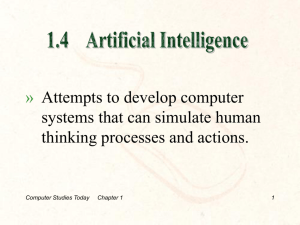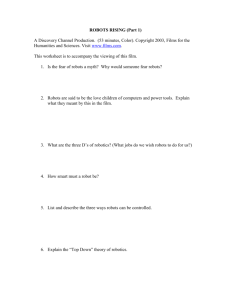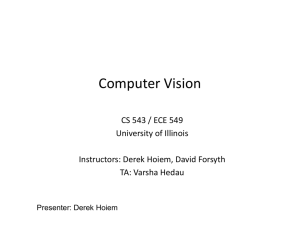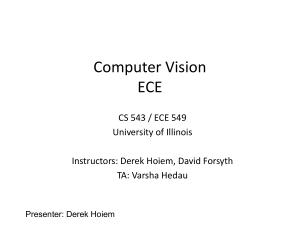Future Realities
advertisement
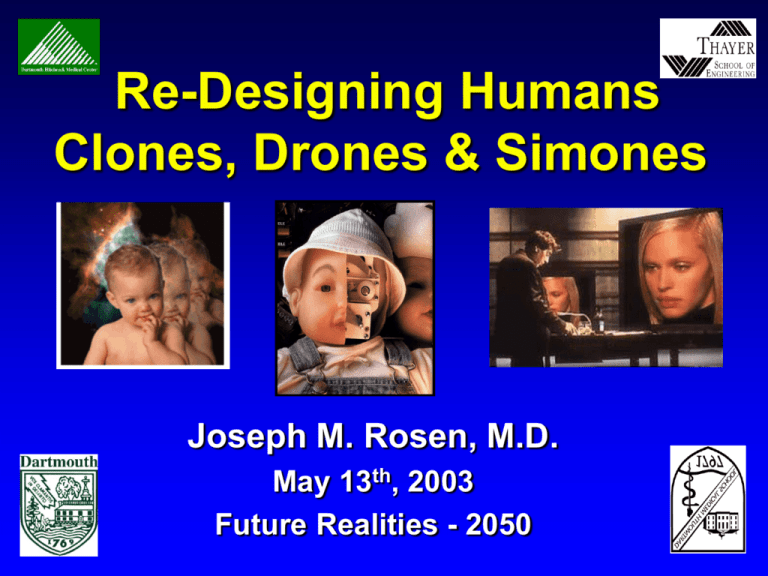
Re-Designing Humans Clones, Drones & Simones Joseph M. Rosen, M.D. May 13th, 2003 Future Realities - 2050 Goals: Artificial Humans X2 looked at Marvels – enhancements to human functions through mutations (evolution) and Engineering What will the role of surrogates be in the year 2050 in the support of humans Surrogates can take many forms and serve functions in many ways Stina’s List: What I should be doing companion father surgeon mentor builder scientist gardener teacher hiker artist Goals: Time and Space The goal is to collapse our notion of time and space – Disneyworld ‘stroller’ story First half of the 21st century will be about artificial humans that can be controlled at a distance – teletransportation Second half of the 21st century will be about surrogates that are autonomous Mars mission causes a time delay Human Surrogates: The Four Technologies Cloning – Star wars, Multiplicity, BR Robots –AI, Terminator,Robocop Virtual Reality – Simone,Matrix,FF Frankenstein – The modern Prometheus – Junk Parts but you still need a human brain (A.B.Normal) Human Surrogates: A history in a Nutshell Where do humans come from - Myth Prometheus - clay The Golem Science and alchemy Human Surrogates: Science and the Renaissance 16th Century Dissection Science Monsters and Marvels Human Surrogates: The Tech of Cloning Cloning - from cell to clone – 1979 A clone provide a set of spare parts for a human from a single cell or HGP They are important later in our story but at his point raise too many ethical issues Human Surrogates: Robot technology Robots provide a story of invention Earliest robots date back to the beginning of civilization as clocks Robots are computers with arms and eyes – or may be reconfigurable Capek R.U.R – Master Slave relationship in society: Robots as Humans : From Film Fiction (Metropolis) to Reality History of Robots: From clocks to companions Early Robots were water clocks 17th Century robots were Automata 18th Century robots were Looms and began Industrial Revolution 19th Century robots were computers 20th Robots became workers – computers with arms and legs 21st Century – our companions? Ancient robot Clocks: First engineering challenges Giant Clock Mechanisms with robots Powered by water Clocks made smaller Clocks perform greater and more detailed tasks for amusement Early scientific inventions Early Robots – Beginning to define our general concepts Artificial Duck by Vaucanson 1738 Walks Quacks Eats, digests, etc. Flaps its wings Toys for the King Robots: Machines that look like humans and perform acts The young writer 1774 Jacquet-Droz’s boyautomaton = doll Performs programmed tasks – writing,music and drawing Mechanical computer Modern Robots are human-like and perform specific acts Commercial Robots as Companions for your family Sophisticated Expensive Integrate into the team and family Designed to do simple tasks Make them cheaper Human Surrogates: The Technology of VR Virtual Reality is harder for my generation to understand They are the most flexible, the cheapest, and part of cyberspace Simone illustrates the advantages Virtual Reality helps us to redesign people : Virtual Humans have many roles to play in Reality Mike McKenna thesis work –first virtual humans : Avatar Design from Cockroach to full Walking human Grinning Evil Death Mike McKenna thesis work –first virtual humans : Avatar Design from Muybridge photos to computer model Can we distinguish reality from virtual reality? : Virtual reality Turing test virtual reality – creative artifice – Jaron Lanier: What is cyberspace: A world where Avatars live Virtual reality creates a new world virtual reality – creative artifice – Jaron Lanier: Early NASA systems –1980’s Scott Fisher and Jaron Lanier Virtual reality creates a new world First Applications for virtual reality – Jaron Lanier: Human Design in Cyberspace: Surgical Simulation Virtual reality creates a surgical environment to create virtual humans From nasal repair to virtually re-configuring the nose: CyberSurgery Augmented reality going beyond physical surgery for nasal repair Virtual surgery Combinations: Frankenstein and Cyborgs Does not provide a surrogate as long as we need a brain Young Frankenstein or Edward Scissorhands still needs key parts from willing or unwilling humans Only for completeness Conclusion: Comparing the Technologies of Surrogates Cloning - biotech Robots Computers VR - Avatars Cyborgs - combos What should be our measure? Life on Mars:Special challenges of Time Mars Mission – 3 year round trip The speed of light becomes a limitation - 20 to 40 minutes to Mars Premium on artificial intelligence Remote control and tele-operations is severely limited in far space travel Mars Exploration - 2014 Mars @ Departure Jan. 24, 2016 161 day Transit Out, 154 day Return Return Inbound Trajectory Earth @ Departure Jan. 20, 2014 Mars @ Arrival June 30, 2014 Earth @ Arrival June 26, 2016 Mars Surface Stay Time: 569 days Earth Orbit Mars Orbit Piloted Trajectories Stay on Mars Surface Mars Perihelion: January 22, 2013 December 10, 2014 From Earth to Mars: When time becomes the Issue Cloning – intelligence has the advantage, although ethics an issue Robots – how intelligent can they be Virtual Reality – greater flexibility Frankenstein and cyborgs– No real advantages over humans in cost Summary Key remaining questions Human machine interfaces How do we improve the performance of humans and surrogates on teams Cybercare in 2050 Human Machine Interface Nerve Chip Project Direct Couple to Nervous system Cochlear Implant for limbs Future Project 2050 Nerve Chip Project A direct interface to robots and computers Review of surrogates: Each has pros and cons Stina’s list of what I should be doing Virtual reality provides the most flexibility Robots are expensive but expendable Clones are potentially the brightest but have the greatest ethical issues Combinations provide all of the problems without any real saving in cost or risks Real Surgeons Telerobotics Telepresence Virtual (AI) Combinations of physical systems in future OR Combinations of physical and information virtual system 2050: The Fabric of Society Healthcare in the 21st Century - cybercare In the last talk on May 27th I will try to cover a way of looking at the future Bringing together all that we have learned in the last two months in this course It will only be my view of your future In 2050 you will all be looking at 70 + or - Movie Quiz: From X2 to Replicants Metropolis Clones Multiplicity Drones Bladerunner Simones Simone Terminator Modern Prometheus Cyborgs Frankenstein Movie Quiz: Artificial Humans Edward Scissorhands Austin Powers Buckaroo Bonzai in the 8th Dimension AI Clones Drones Simones Combinations: Frankenstein Monster and Cyborgs Movie Quiz: Send me more examples
